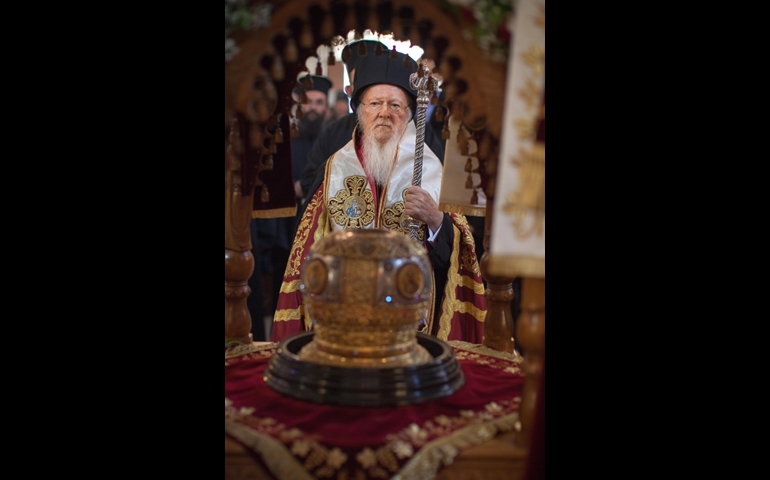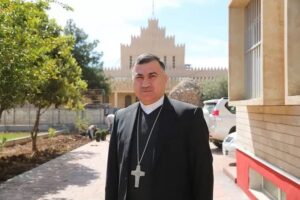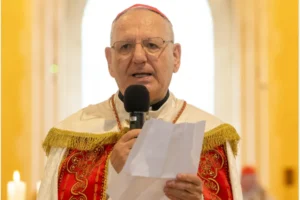Jonathan Luxmoore
Orthodox leaders are finalizing measures to facilitate cooperation between their churches among diaspora and expatriate communities, after long disputes over territorial rivalry and jurisdictional competition.
“It is the common will of all the most holy Orthodox churches that the problem of the Orthodox diaspora be resolved as quickly as possible, in accordance with Orthodox ecclesiology and canonical tradition,” noted a joint declaration. “While a canonical solution is prepared, episcopal assemblies of all canonically recognized bishops in each region should be created or founded in each of the regions.”
The declaration, set to be agreed on June 23, is one of six key drafts before the Holy and Great Council, currently being attended in Crete by 170 bishops and metropolitans from 10 separate Orthodox churches.
It said the assemblies, first proposed at an inter-Orthodox meeting in 2009, should be viewed as “a temporary situation,” pending a wider accord on activities by Orthodox churches operating alongside each other in Western countries.
The document added that decisions would be “taken by consensus” in the assemblies, which would gather bishops in communion with each other under the chairmanship of the Ecumenical Patriarchate of Constantinople.
“The work and the responsibility of these episcopal assemblies will be manifesting the unity of Orthodoxy, the development of common action of all the Orthodox of each region to address the pastoral needs of Orthodox living in the region, and a common representation of all Orthodox vis-a-vis other faiths and the wider society,” the document said. “The episcopal assemblies do not deprive the member-bishops of their administrative and canonical competencies, nor do they restrict their rights in the diaspora. They aim to form a common position of the Orthodox church on various issues — in no way does this prevent member-bishops from remaining responsible to their own churches.”
Orthodox Christianity, with 300 million adherents, is divided into 14 main churches, all recognized as full and equal members of the Orthodox communion, whatever their size and resources.
However, several, including the Patriarchates of Constantinople and Russia, also wield authority over autonomous and self-governing archdioceses and exarchates in various parts of the world, while jurisdiction is disputed over Orthodox churches in Estonia, Macedonia and Moldavia.
Speaking to journalists, Archdeacon John Chryssavgis, spokesman for the Istanbul-based Ecumenical Patriarchate, said a “new situation” had been created by the mass 20th century emigration of Orthodox Christians from their church homelands.
He added that all 14 Orthodox churches sometimes had communities in the same cities or regions, notably in the United States, and said the episcopal assemblies, allowing bishops to work together, should be viewed as “a crucial temporary measure” until “further steps” became possible.
“Some traditional churches have been part and parcel of the local culture and civilization from the start in countries such as Greece, Serbia and Russia, whereas others, such as the Patriarchate of Alexandria, have become over time missionary churches,” Chryssavgis said. “But beyond this, many Orthodox faithful have migrated — to the U.S., Europe, Australia — creating what all churches now agree is a canonical anomaly. We now need a more unified approach by churches in these regions.”
The week-long Council, widely believed the first on such a scale for more than a thousand years, is currently in session at Kolymbari in Crete, despite a walkout by the Patriarchate of Antioch and Orthodox churches in Georgia and Bulgaria and Russia.
In a statement this week, the Antioch Patriarchate said it had not agreed to join the Council until “differences were resolved,” adding that no consensus had been reached on the draft declarations.
However, this was rejected by the Council spokesman, Archbishop Job Getcha of Telmessos, who said the Patriarchate had participated at a final preparatory session in January of the Orthodox Synaxis, or assembly of church leaders, and had later submitted a full list of its delegates, as well as an Arabic translation of key Council texts.
The document said episcopal assemblies would operate in North, Central and South America, as well as in Australia, Britain and Ireland, France, Austria, Belgium, Germany and other European countries, and would aim “to manifest the unity of the Orthodox church, promote collaboration between churches in all areas of pastoral ministry, and maintain, preserve and develop the interests of the communities belonging to the canonical Orthodox bishops of each region.”
It added that they would also “present the common position of the Orthodox church in the region to government, society and to other religious organizations,” while helping promote “the unity of the Orthodox church in its theological, ecclesiological, canonical, spiritual, philanthropic, educational and missionary obligations.”
Job said “many bishops” had made interventions during debates on the document at the Council’s closed-door sessions on June 21-22, adding that attempts at cooperation between bishops since the original 2009 proposals had also produced “useful experiences.”
He added that the Council remained open to the four non-participating churches if they still wished to come to Crete.
Meanwhile, Metropolitan Alexander of Nigeria, representing the Patriarchate of Alexandria, said all Orthodox churches faced “a dilemma of modern times” over the “source and origin of their identity,” which he counted on the new agreement to help resolve.
“Do they most refer to the ecclesial framework — the last things, or eschatology — or is it their national origins which they most adhere to? If it’s the latter, then this weighs us down and makes things much more difficult,” Metropolitan Alexander told a press briefing.
“We need to go back to our ecclesial roots — and once that’s done, it will be quite easy to find a way out of our present impasse.”
[Jonathan Luxmoore’s two-volume study of communist-era persecution, The God of the Gulag, has just been published by Gracewing in the U.K.]
http://ncronline.org/blogs/ncr-today/orthodox-churches-set-out-new-links-diaspora-communities















